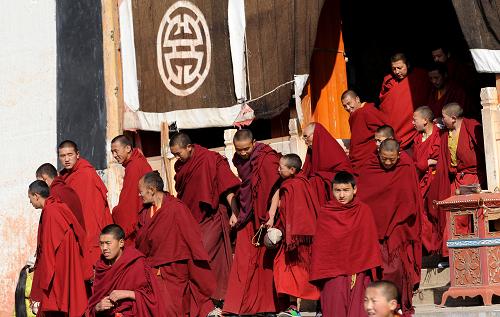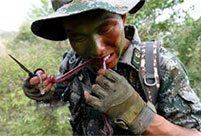

 |
| (File Photo) |
BEIJING, July 20 -- Tibetan monks are turning to modern Buddhism colleges in China after decades of cloistered training.
Losang Jigme, deputy chief of student affairs at Beijing's Tibetan Buddhism College, believes that this year's enrollment examination was the toughest ever.
More than 100 candidates competed for 26 places for advanced students from Gelug and Sakya, two of the six lineages of Tibetan Buddhism.
In the first few years since the college started to award the diplomas "Tho Ram Pa" (doctorate) and "Chi Ram Pa" (master's) in2003, enrollment was based largely on recommendations by monasteries.
"At that time, students from large monasteries often significantly outperformed those from smaller temples and students varied in their scholarly attainments," said Lobsang Jigme.
With the number of students seeking places steadily increasing, enrollment is getting more and more competitive, he added.
GROWING POPULARITY
Jampa Chide, a scripture lecturer at the college, attributes the more fierce competition to the college's growing popularity among Tibetan clergy. According to the college's admission criteria, candidates must have completed study of five kinds of classical works of Tibetan Buddhism on discipline, logic, wisdom, etc.
"That means each candidate must be senior clergy with at least20 years of monastic training and be outstanding among his peers," he said.
"Students have to work hard to get their degrees because the college adopts a lowest place elimination mechanism. Only 11 of the13 advanced students from each lineage will get the Tho Ram Pa degree each year," said Jampa Chide.
Established in 1987 with the endorsement of the State Council following a proposal by the late 10th Panchen Lama, teaching facilities at the college cannot meet demand and each of the the six lineages must take turns. Normally two lineages are covered each year. All courses are free and for Tho Ram Pa, students must study for three years. Those who fail to graduate in time may take part in the next thesis defense for the students of the same sect, potentially three years later.
A new regulation introduced on July 10 means the college will now only award the Tho Ram Pa diploma. The Chi Ram Pa diploma will be administered by Buddhist colleges at lower levels which are already responsible for the Chin Ram Pa, the equivalent of a bachelor's. Lobsang Jigme confirmed that the 25 intermediate students to enter school this fall for Chi Ram Pa will be the last of their kind.
College vice president Liu Peng said that the faculties of Buddhist Colleges in Tibet and other provinces with significant Tibetan populations would soon meet to optimize curriculum design and coordinate teaching.
"There were two milestones in the reform of Tibetan Buddhism education," he said. "One was in 1987 when the Beijing college was established. The other was in 2003 when the college started to award diplomas in all six lineages."
In 2003, there were no clear-cut or unified criteria on awarding diplomas. Only now have the new regulations clarified the duties of colleges at various levels. The significance of monasteries to Buddhism colleges is also recognized.
MONASTERY AND COLLEGES
"Modern Buddhist colleges must be rooted in the monasteries and must depend on monastic training. Senior clergy who receive modern academic education can improve their academic competence and be more more useful in educating others," said Liu.
Thus far, 121 clergy have graduated from the college with Tho Ram Pa and 112 with Chi Ram Pa, spread over all six lineages. After graduation, quite a number of them have taken charge of cenobian training in the monasteries where they previously studied .
"Under the traditional monastery education system, it was difficult for Buddhism students of different lineages to exchange views and learn from one another in one class. Visiting masters of different lineages could only be individual reference points," said Jampa Chide.
At the college, however, students of different sects take common courses and have many more opportunities to exchange ideas than their peers back in the monasteries, he added.
It is widely believed among Tibetan clergy that a scholar must excel in teaching, debating and book writing.
"Modern monastery education emphasizes teaching and debating far more than book-writing. In colleges, students receive more training in writing as they have to author a lot of papers, not just in Tibetan but also Mandarin. The new environment expands students' horizons," said Jampa Chide who studied in the Sera Monastery in Lhasa for 30 years. Sera is a prestigious Gelug monastery famous for scripture debates.
This April, a delegation of seven advanced students from the college had their first debate contest with peers in Sera. The debate, which lasted for a week, was conducted in the presence of more than 400 clergy.
"The audience was large. When I participated in the test for Geshe ([a title for scripture teachers in the Gelug sect], only 300 monks observed my debate," said Jampa Chide.
Hearing many of his friends and teachers from Sera commending the college delegation, Jampa Chide said he felt very happy and proud.
It was vice president Liu who suggested the unprecedented contest in the monastery. "More such debates will be held in the future to test the scholarly attainments of our students," he said.
OVERSEAS STUDENTS
As Tibetan Buddhism has spread far from Tibetan regions, Liu insists an open-minded approach must be adopted to make Tibetan clergy better ambassadors for Buddhism in modern times.
"Without the support of the monasteries and a global vision, Buddhist colleges can only go so far," he said.
According to the new regulation, China's Buddhist colleges may enroll overseas students and scholars, but to obtain a diploma they must meet the same requirements as Chinese candidates.
Liu Peng believes there is still a long way to go in international academic exchange and the education of international students. Although never having enrolled an overseas student, the college has sent delegations to Thailand, Nepal and Mongolia.
"Local Buddhist circles have all expressed interest in sending monks to study in Beijing. In terms of enrolling overseas students, we are just starting out," said Liu.
Next, he said the college plans to expand exchanges with Japan, the Republic of Korea, Russia, India and Myanmar.
 PLA soldiers eat raw snake meat in harsh training
PLA soldiers eat raw snake meat in harsh training Doctors use 3D-printed skull to save girl
Doctors use 3D-printed skull to save girl Kiss contest held in Nanning, SW China
Kiss contest held in Nanning, SW China Yunnan-Myanmar Road: The past and present
Yunnan-Myanmar Road: The past and present Campus belle of Xiamen University gets popular online
Campus belle of Xiamen University gets popular online Who says moms cannot be trendy and hot?
Who says moms cannot be trendy and hot? 10 Chinese female stars with most beautiful faces
10 Chinese female stars with most beautiful faces Eight fruits that defend men's health
Eight fruits that defend men's health  Top 10 secrets of longevity
Top 10 secrets of longevity Saffron-collar workers - a Buddhist break
Saffron-collar workers - a Buddhist break One-China should transcend Taiwan politics
One-China should transcend Taiwan politics Celebrity geeks: the worship of China’s top gaokao scorers
Celebrity geeks: the worship of China’s top gaokao scorers Higher state of being: Women practice yoga at 2,000 meters
Higher state of being: Women practice yoga at 2,000 meters Day|Week